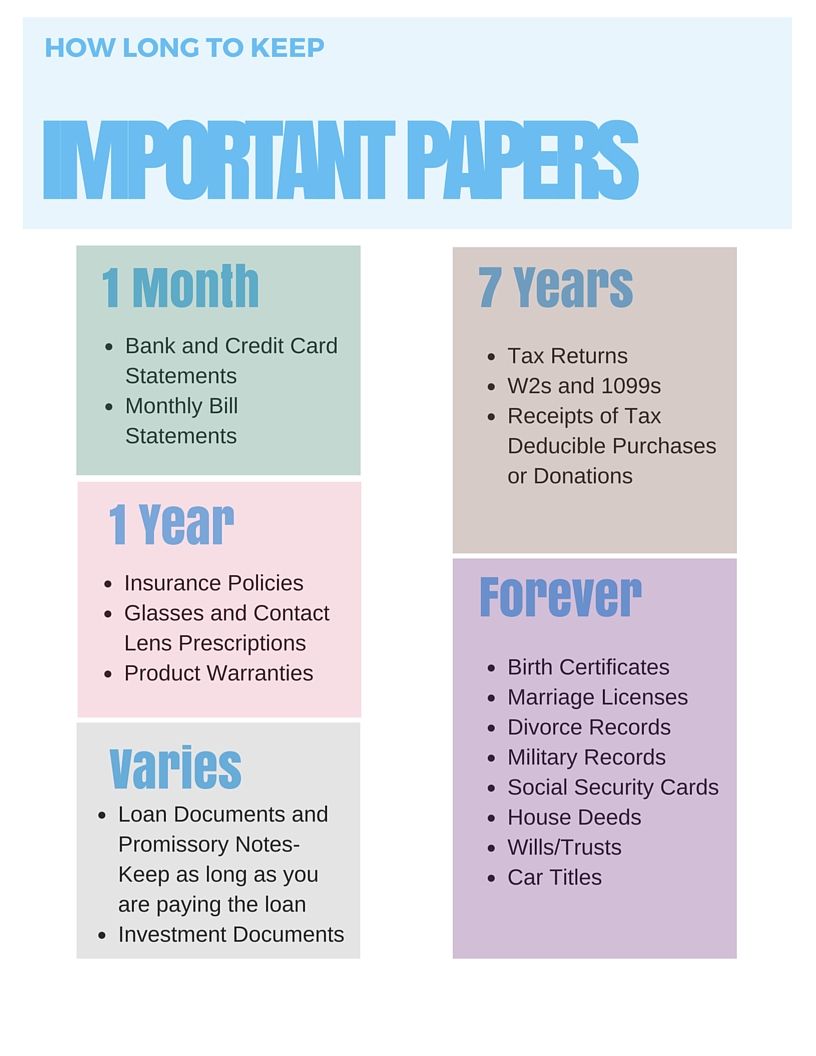How Long to Keep Various Types of Paperwork

Organizing Your Important Documents

The key to reducing stress and clutter lies in effective organization and knowing how long to keep various types of paperwork. Whether it’s for financial, legal, or personal purposes, understanding which documents to retain and for how long can simplify your life immensely.
Tax Documents and Receipts

Tax documents are some of the most critical records you need to keep:
- Receipts: Keep for at least 3 years if they pertain to tax-deductible expenses. For big purchases like a vehicle or appliances, retain them for warranty issues.
- Tax Returns and Related Documents: The IRS has a standard 3-year window for audits, so keep all tax-related documents for at least this period. However, if you have filed a claim for worthless securities or bad debt, extend this to 7 years.
⚠️ Note: If you omit 25% of your income, the IRS can go back 6 years for audits, so retain records for at least this long if concerned about major discrepancies.
Bank Statements, Pay Stubs, and Investment Records

For most people, keeping records for these items:
- Bank Statements: Keep for 1 year after the year they pertain to. If they relate to tax-deductible expenses or purchases, follow the tax document guidelines.
- Pay Stubs: While you can typically discard after receiving your W-2, it’s wise to keep them for at least 1 year in case of discrepancies.
- Investment Records: Keep annual statements for at least 3 years, but extend this if they impact your taxes or if you plan to take a tax deduction.
Legal Documents and Contracts

Legal documents and contracts need special attention:
- Home Purchase Documents: Retain these indefinitely for property ownership verification, tax deductions, or if you sell the home.
- Marriage and Divorce Records: Keep indefinitely for legal and estate planning reasons.
- Contracts: Hold onto them for as long as the contract remains in effect plus a reasonable time afterward, usually 3 to 6 years.
- Wills and Estate Planning: Store these documents indefinitely for legal and estate purposes.
💡 Note: If you’ve sold a property, keep records related to improvements, purchase, and sale for at least 3 years to validate any capital gains tax calculations.
Medical Bills and Insurance Policies

These records are crucial for both health care and financial reasons:
- Medical Bills: Keep for at least 3 years. If related to health insurance claims, retain for 3 years after the claim is resolved.
- Insurance Policies: Retain current policies and at least the last 3 years for claims or disputes.
💡 Note: Keep records of ongoing treatments or long-term conditions for as long as necessary for continuity of care or insurance claims.
Utility Bills and Service Contracts

Most utility and service records can be kept for a short period:
- Utility Bills: Retain for 1 year unless they are part of a tax deduction claim.
- Service Contracts: Keep for the term of the service plus a reasonable time afterward, often 1 year.
How to Organize and Store Your Paperwork

The act of organizing your paperwork is as important as deciding what to keep:
- Create a System: Categorize documents by type (tax, financial, legal, personal, etc.).
- Use Physical and Digital Storage: Physical folders can be scanned or photographed to create a digital backup.
- Label Clearly: Use labels or color coding for quick reference.
| Document Type | Retention Period |
|---|---|
| Tax Returns | 3 to 7 Years |
| Receipts | 3 Years |
| Bank Statements | 1 Year |
| Pay Stubs | 1 Year |
| Investment Records | At Least 3 Years |
| Legal Documents | Indefinitely |
| Medical Bills | 3 Years |
| Insurance Policies | Current + Last 3 Years |
| Utility Bills | 1 Year |
| Service Contracts | Contract Term + 1 Year |

Managing your paperwork effectively involves knowing how long to keep various types of paperwork and organizing them systematically. Not only does this reduce clutter, but it also prepares you for audits, disputes, or legal matters. By understanding these guidelines, you can ensure that you're keeping what's necessary without holding onto unnecessary paperwork. This approach not only saves space but also time and stress in the long run, offering peace of mind and an organized home or office environment.
What should I do if I’m unsure about keeping a document?

+
If you’re uncertain about whether to retain a document, it’s better to keep it for the longest recommended time. This ensures you’ll have it should the need arise.
Is digital storage of documents acceptable?

+
Yes, digital storage is not only acceptable but also recommended as a backup method. Ensure that your digital records are secure, backed up, and accessible when needed.
Do I need to keep physical copies of documents if I have digital backups?

+
For some documents, it’s prudent to keep physical copies, especially legal documents like wills or home purchase agreements. However, for most other records, a secure digital backup suffices.